1800's
|
1884
|
The first Field Day was held among athletes from several Michigan colleges. This led to the founding of the MIAA four years later.
Albion and Michigan Agricultural (Michigan State University) met in the first intercollegiate football game in the state of Michigan.
|
|
|
1888
|
Delegates from several colleges met on March 17 in Jackson, Michigan, to consider organizing a conference. One week later, Albion, Hillsdale, Michigan Agricultural (MSU), and Olivet became charter members. The MIAA was officially founded on March 24, 1888.
The first MIAA Field Day was held at East Lansing, Michigan, May 31 to June 2, with the first league championships awarded in baseball (Michigan Agricultural), men’s track (Hillsdale), and men’s tennis (Olivet).
|
|
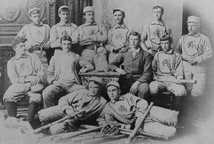
The success of the athletic program at Michigan Agricultural College during the early years of the MIAA was due to a large degree to Leander Burnett, an American Indian. Burnett is pictured with members of the 1890 MAC baseball team. He is in the top row, fourth from the left, with the mustache. Pitcher, third baseman and outfielder on the baseball team, he also starred in track and field, winning an incredible 37 first places at the MIAA Field Days from 1888 to 1892.
|
1889
|
Albion and Olivet engaged in an exhibition "football match." |
|
|
1891
|
Albion defeated Hillsdale 36-4 in the first football game between MIAA members. |
|
|
1892
|
Michigan Normal College, also known as Ypsilanti Normal, and now Eastern Michigan University, was admitted to the MIAA. (See 1926) |
|
|
1894
|
Albion was crowned the first MIAA football champion. |
|
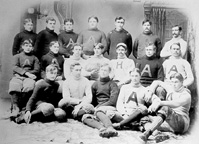
In 1894 Albion was crowned the first official MIAA football champion, posting an overall 7-0-1 record. The Britons defeated Michigan, 26-10, and tied Notre Dame, 6-6.
|
1896
|
Kalamazoo College was admitted to the MIAA.
Women's tennis became part of the conference tennis championship. Albion, Hillsdale, and Olivet are known to have participated in women's tennis at the 1896 Field Day; other MIAA schools may have participated also. Women continued to compete in the tennis championships until 1925. |
|
|
1898
|
Intercollegiate men's basketball first played among MIAA colleges. |
|
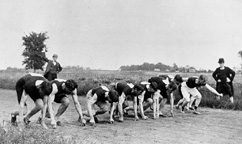
The start of the 100-yard dash at a Field Day meet between Alma and Saginaw Valley in June, 1897.
|
1900's
|
1900
|
On February 12, Albion defeated Hillsdale 36-7 and 8-6 in the first known intercollegiate women's basketball games between two MIAA schools. |
|
|
1902
|
Alma College admitted to the MIAA. |
|
|
1907
|
A conference committee of faculty members was established to oversee governance of the MIAA. The first eligibility rules were adopted for MIAA student-athletes.
Michigan Agricultural College (MSU) withdrew from the MIAA. (see 1888) |
|
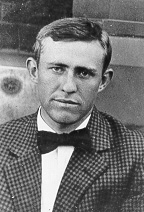
Jesse Harper began his coaching career at Alma. Later, as head football coach at Notre Dame University, he introduced an offensive strategy that popularized the forward pass.
|
1908
|
Adrian College was admitted to the MIAA. (See 1922 and 1937) |
|
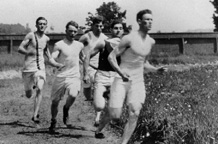
Frank "Fleety" McComb of Alma (in the lead) won the 440-yard dash on his home track in the 1908 Field Day.
|
1910's
|
1911
|
Men's basketball became an MIAA championship sports in 1910-11. Albion and Alma were co-champions in the first year. |
|
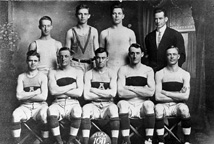
The first MIAA men's basketball season, 1910-1911, ended in a co-championship between Alma, pictured left, and Albion.
|
1913
|
The MIAA made its first attempt to engage "satisfactory" referees and umpires. |
|
|
1914
|
National collegiate track rules were adopted by the MIAA. |
|
|
1917
|
Most league championships were suspended in 1917 & 1918 because of World War I. |
|
|
1920's
|
1922
|
Men's cross country became an MIAA championship sport in the fall of 1922. Kalamazoo was the first champion.
Dr. Clark L. Herron of Hillsdale College was named the first “arbitrator” (commissioner) of the MIAA. Herron was also known as the association referee. Herron served until 1931.
Adrian College withdrew from the MIAA. (See 1908 and 1937) |
|
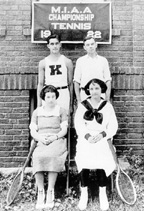
The results of men's and women's competitions were combined to determine the MIAA tennis champions from 1896 to 1925. Leading Kalamazoo to the 1922 league crown were Leta Hamilton and Dorothy Putt (seated) and Leland Hall and Thomas Vroegindewey.
|
1923
|
Kalamazoo College set a "world record" for consecutive basketball championships by winning the MIAA title for the tenth time in as many years (1914-23). |
|
|
1926
|
Hope College was admitted to the MIAA.
Michigan Normal College (EMU) withdrew from the MIAA. Following the withdrawal of Michigan Normal, all track and field records established by Michigan Normal and Michigan Agricultural (MSU) were removed from official MIAA records.
Women were “excused” from further tennis competition in the MIAA prior to the 1926 championships. This was to comply with a “ban” on intercollegiate competitions for women endorsed by the national organization of women’s athletic associations.
|
|
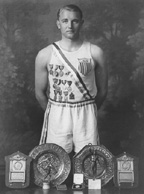
Among the all-time MIAA track and field greats was Lee Bartlett of Albion who set MIAA, AAU, and NCAA records in winning the 1928 national collegiate javelin championship. He went on to compete for the United States in three Olympics, winning the bronze medal in 1928.
|
1929
|
Baseball was dropped as an MIAA championship sport after the 1928-29 season. (See 1948) |
|
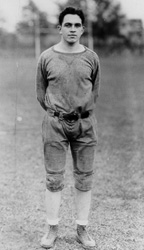
Famed Michigan restuarateur Win Schuler held a long association with the MIAA, first as captain of Albion's undefeated 1929 football team and later as the league commissioner, 1961-1965.
|
1930's
|
1931
|
John Hasselman was appointed the MIAA commissioner. Hasselman served until 1933. |
|
|
1932
|
Men's cross country was dropped as an MIAA championship sport after the 1932 season. (See 1922 and 1946) |
|
|
1933
|
DeGay Ernst was appointed MIAA commissioner. Ernst served until 1961 and is the longest-tenured commissioner in MIAA history.
The MIAA adopted the use of certificates to recognize all-conference players. |
|
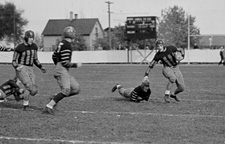
Louis Japinga (ball carrier) was the first Hope athlete to earn All-MIAA honors, gaining recognition in football three straight years, 1931-1993.
|
1934
|
The MIAA All-Sports Award was inaugurated, recognizing the member school with the best cumulative finish in all men's sports. Kalamazoo College was the first recipient. (See 1981)
Golf became an MIAA championship sport in the spring of 1934. Hope was the first champion.
Junior college athletes were granted permission to participate in MIAA athletics beginning immediately upon enrollment at an MIAA school, provided their scholarship met league requirements. |
|
|
1935
|
The MIAA provided a round-robin football schedule for the first time. |
|
|
1936
|
Men's indoor track became an MIAA championship sport in 1935-36. Kalamazoo was the first champion. (See 1948)
Albion College hosted the first "play day" for women of the MIAA on May 10. Play days featured "recreational" sports and emphasized participation rather than competition. This was the beginning of organized women's athletics in the league. Except for three years during World War II, play days were sponsored every year until 1961.
Albion and Olivet played to a 2-2 tie in the first known intercollegiate field hockey game between two MIAA schools. |
|
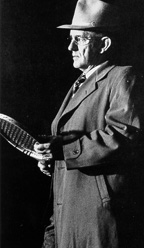
Kalamazoo established its national tennis reputation under coach Allen B. Stowe. From 1931 to 1956 he guided Kalamazoo to 21 men's and women's MIAA tennis crowns. Stowe Tennis Stadium on the Kalamazoo campus is named in his honor.
|
1937
|
Adrian College was re-admitted to the MIAA. (See 1922) |
|
|
1938
|
Kalamazoo College won all six MIAA championships in 1937-38 (basketball, football, golf, indoor track, outdoor track, and tennis) for the only "grand slam" of league-sponsored sports in the history of the conference.
Kalamazoo College hosted the first women's tennis championship since 1925. The tournament was not sponsored by the MIAA, but rather the forerunner of a parallel women's league.
Ordell McElhaney of Albion was voted the league's first most valuable player in football. |
|

Bob Devaney, an All-MIAA end at Alma in 1937, went on to become one of the great coaches in American college football history. In 16 years at the universities of Wyoming and Nebraska, he compiled a 136-30-7 record, the best in the nation at the time he retired from coaching in 1972.
|
1940's
|
1940
|
Olivet College withdrew from the MIAA. (See 1952) |
|
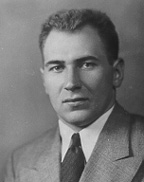
The MIAA's first football All-American was Walt Ptak of Albion, an All-MIAA end of the 1939 and 1940 Britons.
|
1941
|
Female representatives of the MIAA colleges met at Kalamazoo College and founded a separate women's conference. Charter members were Adrian, Albion, Alma, Hillsdale, Hope, Kalamazoo and Olivet. Originally known as the Athletic Federation of Michigan College Women, the name was changed to the Women's Intercollegiate Athletic Association (WMIAA) in 1946. The WMIAA was officially founded on March 20, 1941, almost exactly 53 years after the founding of the MIAA.
Olivet College withdrew from the WMIAA. (See 1952) |
|
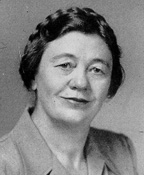
Josephine "Jo" Dunn of Albion can appropriately be called the "Mother of the WMIAA." Her leadership in women's athletics led to the founding of the women's league in 1941. The league's most valuable archer award was named in her honor.
|
1943
|
Most men's and women's league championships were suspended from 1943 to 1945 because of World War II.
On May 10, Alma defeated Kalamazoo 15-10 in the first known intercollegiate women's softball game between two MIAA schools. |
|
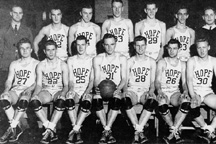
The first Hope men's basketball team to go undefeated in the MIAA was the 1942-43 "Blitz Kids".
|
1946
|
Men's cross country was resumed as an MIAA championship sport in the fall of 1946. (See 1922 and 1933) |
|
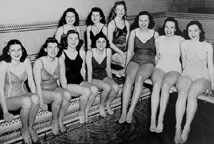
The 1945-46 Kalamazoo women's swimming team competed in the first national collegiate meet for women, finishing second behind Michigan State University.
|
1947
|
Russ DeVette of Hope was voted the league's first most valuable player in men's basketball. DeVette went on to coach at Hope, guiding the Flying Dutchmen to nine men's basketball titles between 1957-68. |
|
|
1948
|
Men's indoor track was dropped as an MIAA championship sport after the 1947-48 season. (See 1936 & 2016) |
|
|
1950's
|
1952
|
Olivet College was re-admitted to the MIAA and WMIAA. (See 1888, 1940, 1941)
Archery became a WMIAA championship sport in the spring of 1952. Hope was the first champion.
|
|
|
1953
|
Calvin College was admitted to the MIAA and WMIAA. |
|
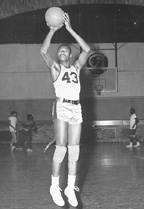
Henry Hughes of Adrian was the MIAA men's basketball scoring champion three years in-a-row in the mid-1950s. He is one of only six players in MIAA history to score over 1,000 points in his league career.
|
1956
|
Albion's Janet Van Wingen was the first recipient of the annual Sue Little Sportsmanship Award in women's tennis. |
|
|
1958
|
Albion's Dale Brubaker and Kalamazoo's Les Dodson were the first recipients of the annual Stowe Memorial Award for sportsmanship in men's tennis. |
|
|
1960's
|
1960
|
Hillsdale College withdrew from the MIAA. (See 1888)
The MIAA banned participation in post-season competition by its member schools. |
|
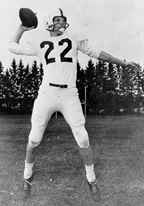
Jim Northrup, Detroit Tigers outfielder and hero of the 1968 World Series, was a four-sport standout at Alma, excelling in baseball, basketball, football, and track.
|
1961
|
Win Schuler, Sr., was appointed the fourth MIAA commissioner. Schuler served until 1965.
|
|
|
1962
|
Adrian's Miriam Benton was the first recipient of the annual Jo Dunn Award for sportsmanship in archery. |
|
|
1963
|
Hillsdale College withdrew from the WMIAA. (See 1941) |
|
|
1965
|
Kalamazoo’s Tom Nicolai becomes the first-ever MIAA student-athlete to receive an NCAA postgraduate scholarship.
John Hoekje was appointed MIAA commissioner, becoming the fifth in conference history. Hoekje served until 1971.
The league instituted most valuable player awards during the 1964-65 school year in five sports.
|
|
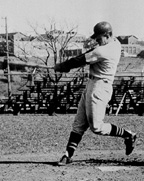
John Persons of Kalamazoo is the only baseball player to win All-MIAA honors four years in-a-row. He was also All-MIAA in football three times.
|
1968
|
Field hockey became a WMIAA championship sports in the fall on 1968. |
|
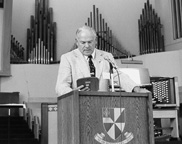
An eloquent spokesman for the MIAA has been Morley Fraser, who had a distinguished coaching career at Albion with 11 league champions in football and baseball.
|
1969
|
Wrestling became an MIAA championship sports in 1968-69. Adrian was the first champion.
Adrian and Kalamazoo met in the first known intercollegiate women's swimming meet between two MIAA schools. |
|
|
1970's
|
1970
|
Men's soccer became an MIAA championship sport in the fall of 1970. Calvin and Hope were co-champions in the first year. |
|
|
1971
|
Albert L. Deal was appointed sixth commissioner of the MIAA and served until 1991.
Men’s swimming became an MIAA championship sport in 1970-71. Albion was the first champion.
|
|
|
1972
|
Golf was a spring sport in the MIAA until 1972. That year, the MIAA sponsored championships in golf in both the spring and fall. Since 1972, golf has been a fall sport in the MIAA.
Volleyball became a WMIAA championship sport in the fall of 1972. |
|
|
1973
|
Women's basketball became a WMIAA championship sport in 1972-73. |
|
|
1976
|
The Kalamazoo College men's tennis team won the NCAA Division III national title -- the first national team championship for an MIAA college.
The league's ban on post-season competition was lifted. |
|
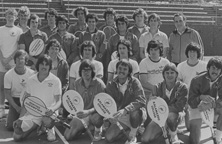
The MIAA's first NCAA Division III national championship team was the 1976 Kalamazoo men's tennis squad, coached by George Acker. Kalamazoo also won the NCAA crown in 1978, 1986, 1987, 1991, 1992 and 1993.
|
1977
|
Women's swimming and softball became WMIAA championship sports in 1976-77. Kalamazoo won the first swimming championship.
The presidents of the MIAA colleges approved a resolution favoring the combined governance of men's and women's sports. |
|

Mark Veenstra of Calvin is the only player in MIAA men's basketball history to be voted the most valuable player four times, 1974-77. Veenstra holds the MIAA single season and career scoring records.
|
1978
|
Kalamazoo tennis players Chris Bussert and Jim Hosner become the first MIAA student-athletes to win national titles. Bussert and Hosner won 1978 NCAA Division III doubles title; Bussert also won the men’s tennis singles title.
The MIAA and WMIAA were combined to form a unified men’s and women’s league. The first year of combined governance was 1978-79.
Basketball standout Mark Veenstra of Calvin was the first athlete in MIAA history to be voted the league’s most valuable player four consecutive years (1975 through 1978).
|
|
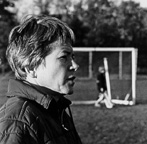
A.L. "Tish" Loveless of Kalamazoo is the winningest coach of women's teams in MIAA history with 28 championships in archery, field hockey, and tennis, 1953-1986.
|
1979
|
Women's track became an MIAA championship sport in the spring of 1979. Calvin was the first champion.
Calvin won the first MIAA softball championship. |
|
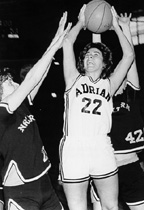
From 1978 to 1980, Jamie Van Arsdalen of Adrian averaged 24 points a game against MIAA basketball opponents. That still stands as a league record as does her career field goal shooting average of 62 percent.
|
1980's
|
1981
|
Archery was dropped as an MIAA championship sport after the 1981 season. (See 1952)
Women's cross country became an MIAA championship sport in the fall of 1981. Albion and Alma were co-champions in the first year. |
|
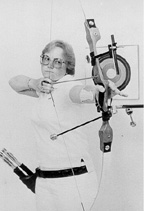
Merry Lu Jordan of Kalamazoo topped MIAA archers in scoring in 1980 and 1981. She qualified for the 1984 Olympic trials.
|
1982
|
For the first time, the MIAA All-Sports Award was determined on the basis of both men’s and women’s sports. Hope was the first recipient under the new criteria.
The first all-conference and most valuable recognitions were given in women’s sports.
Hope’s Sarah Stanwood won the 400-yard individual medley at the AIAW swimming and diving championships, becoming the first female MIAA student-athlete to win a national title.
|
|
|
1983
|
Tracy Garner of Albion was the MIAA's first NCAA Division III national track champion, capturing the high jump in 1983. Garner won the league high jump title four consecutive years (1980-83) and was both the long jump and triple jump champion three times (1981-83). |
|
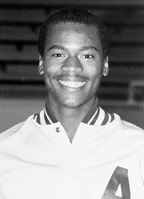
Tracy Garner of Albion was the MIAA's first NCAA Division III national track champion, capturing the high jump in 1983. He won the league high jump title four straight years, 1980-1983, and was both the long jump and triple jump champion three times, 1981-83.
|
1984
|
Wrestling was dropped as an MIAA championship sport after the 1983-84 season. (See 1969)
Albion's Sue Leiby won the 1,650-yard freestyle at the NCAA Division III swimming and diving championships -- the first female athlete from an MIAA college to win an NCAA national title. |
|
|
1985
|
Kalamazoo's Lynn Achterberg was the first woman from an MIAA college to receive an NCAA post-graduate study scholarship. |
|
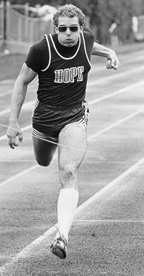
Rob Appell of Hope was the first MIAA athlete to be voted the most valuable trackster three years in-a-row, 1984-86. He was the NCAA Division III national high jump champion in 1985.
|
1986
|
Timon Corwin of Kalamazoo was the 1986 NCAA Division III singles tennis champion and recipient of the Arthur Ashe Award for combining excellent play, sportsmanship, and scholarship. Earlier in his senior year, Corwin became the first player in MIAA history to be named league MVP and to receive the Stowe sportsmanship award. |
|

Timon Corwin of Kalamazoo was the 1986 NCAA Division III singles tennis champion and recipient of the Arthur Ashe Award for combining excellent play, sportsmanship, and scholarship. Earlier in his senior year, Corwin became the first player in MIAA history to be named league MVP and to receive the Stowe sportsmanship award.
|
1987
|
The MIAA had its most successful year (1986-87) in NCAA Division III competition to this point. Kalamazoo wins its fourth men's tennis title since 1976. The MIAA also has five individual national champions: Shelly Russell of Hope in swimming (500 and 1,650 yard freestyle); Rob Peel of Hope in swimming (50 yard freestyle); Jim Burda and Alex Palladino of Kalamazoo in tennis (doubles); and Dan Pekrul of Albion in track (javelin). |
|

Hope crowned two NCAA Division III swimming champions in 1987, a first for the MIAA. Pictured with Coach John Patnott are Shelly Russell and Rob Peel. Russell set national records in winning two events, the 500-yard and 1650-yard freestyle races, while Peel won the 50-yard freestyle title. Peel qualified for the 1988, 1992 and 1996 Olympic trials. Patnott coached Hope's swimming teams to 32 league championships.
|
1988
|
The MIAA celebrated its anniversary as America’s oldest collegiate conference by commemorating its 100th year of continuous operation.
|
|
|
1989
|
Hope's Shelly Russell was voted the NCAA Division III female swimmer of the year for the second consecutive year. Russell was an NCAA champion seven times -- the most successful MIAA athlete in history at a national level.
Women's soccer became an MIAA championship sport in the fall of 1989. Kalamazoo was the first champion. |
|
|
1990's
|
1990
|
Kalamazoo men’s tennis coach George Acker was named the college tennis Coach of the Decade. Acker guided the Hornets to 32 consecutive MIAA championships.
The first women’s NCAA championship by an MIAA team was captured by Hope College in women’s basketball. Hope coach Sue Wise is voted the Division III national coach of the year.
The MIAA announced its first Honor Roll of Athletes. A total of 281 students were recognized for achieving a minimum 3.5 cumulative grade point average during the 1989-90 school year.
Field hockey was dropped as a league sport after the 1990 season.
|
|
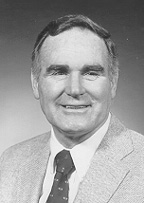
George Acker of Kalamazoo College is the winningest coach of men's teams in MIAA history with 35 championships from 1959-93. He also coached Kalamazoo to seven NCAA Division III National Championships in men's tennis.
|
1991
|
The 100th MIAA Track and Field championships were held at Alma College.
Women’s golf became an MIAA championship sport in the fall of 1991. Hope was the first champion.
Three MIAA coaches were voted Division III national coaches of the year in their respective sport -- Pete Kowall of Kalamazoo in women’s soccer, John Patnott of Hope in men’s swimming, and George Acker in men’s tennis.
Sheila Wallace-Kovalchik was appointed the seventh commissioner of the MIAA effective July 1, 1991. Wallace-Kovalchik is the first female MIAA commissioner and serves until 2002.
|
|
|
1992
|
The MIAA instituted a post-season tournament to determine the league’s qualifier in the NCAA Division III men’s basketball playoffs. Calvin was the first champion.
The MIAA had three NCAA Division III national champions - Calvin in men’s basketball, Alma in women’s basketball, and Kalamazoo in men’s tennis.
Calvin men’s basketball coach Ed Douma was voted the Division III national coach of the year.
The Joint Archives of Holland became the repository of MIAA historical materials.
|
|
|
1993
|
The first post-season women’s basketball tournament was held to determine the league’s qualifier to the NCAA Division III playoffs. Calvin was the first champion.
Kalamazoo won a record seventh NCAA Division III national championship in men’s tennis. George Acker, the winningest coach in MIAA history, retired from Kalamazoo College.
The NCAA crowned six individual national champions from the MIAA, including the first in women’s track.
Four MIAA athletes were awarded NCAA Postgraduate Scholarships - Jeff Bannink of Hope, Steve Honderd of Calvin, Jennifer Kennedy of Albion, and Lewis Miller of Kalamazoo.
Renea Bluekamp of Calvin won the women’s NCAA Division III cross country championship, becoming the first MIAA athlete to do so.
Albion College graduate Cedric Dempsey was appointed executive director of the National Collegiate Athletic Association (NCAA). Dr. Dempsey was an five-time All-MIAA athlete in basketball and baseball (1952-54).
|
|
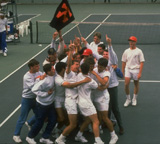
Kalamazoo College has one of the premier men's tennis program in NCAA Division III. The Hornets have won seven national championships, including the 1993 crown won by the team pictured.
|
1994
|
Tennis player Jackie Aurelia of Kalamazoo College became the first female athlete to be the most valuable player in an MIAA sport four consecutive years.
Albion won NCAA Division III national championship in football.
The MIAA had eight individual national champions during the 1993-94 academic year.
|
|
|
1995
|
Three MIAA teams - Alma, Calvin and Hope - qualified for the NCAA Division III softball playoffs. |
|
|
1996
|
Amy Kuiper of Calvin became the first female student-athlete to achieve All-MIAA honors eight times in her career.
Defiance College of Ohio and Saint Mary’s College of Indiana were admitted to membership effective with the 1997-98 school year.
Betsy Haverkamp of Calvin became the first MIAA female athlete to achieve NCAA All-America honors four consecutive years in cross country.
|
|
|
1997
|
On Jan. 29, VanAndel Arena in Grand Rapids hosts 11,442 fans to watch Hope defeat Calvin, 70-56. The attendance total set a new NCAA Division III men’s basketball attendance record, which stood until the 2009-10 season; it currently ranks second all-time in Division III men’s basketball.
David Lefere of Albion (football and baseball) and Betsy Haverkamp of Calvin (cross country and track) became the first MIAA student-athletes to be named Academic All-Americans in two sports.
The MIAA commemorates its 100th year of conference football competition.
For the first time, the MIAA qualified two teams for the NCAA Championships in both men’s soccer (Alma and Hope) and women’s soccer (Calvin and Kalamazoo).
|
|
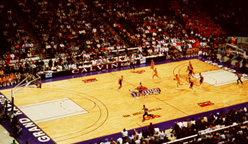
On Jan. 29, VanAndel Arena in Grand Rapids hosts 11,442 fans to watch Hope defeat Calvin, 70-56. The attendance total set a new NCAA Division III men’s basketball attendance record, which stood until the 2009-10 season; it currently ranks second all-time in Division III men’s basketball.
|
1998
|
Marvin Zuidema, long time men's soccer coach at Calvin College, was awarded the Bill Jeffrey Award by the National Soccer Coaches Associaton. The Jeffrey award is named after Bill Jeffrey legendary Penn State University coach. The award is annually presented to one person selected for long time dedication and contribution to men's or women's college soccer. |
|
|
1999
|
Beginning in 1998-99, the MIAA presents separate awards for the leading men’s and women’s sports performances in a school year in addition to continuing the All-Sports award.
Calvin wins the NCAA Division III women’s cross country championship.
For the first time, the MIAA qualified three teams for the NCAA Division III Women’s Soccer Championships: Calvin, Kalamazoo, and Olivet.
Olivet was chosen to host the NCAA Division III men’s golf championships in 2000.
For the first time, the MIAA qualified three teams for the NCAA Division III Women’s Basketball Championship: Calvin, Defiance, and Hope.
Hope’s Josh Boss won the 100-yard and 200-yard breaststroke, both in then-national record times, to become the first-ever MIAA men’s swimmer to be a two-time national champion in the same year.
MIAA Faculty Athletic Representatives award the first team GPA awards for outstanding academic accomplishment. Thirty-two teams achieved the distinction for the 1998-99 school year.
|
|
|
2000's
|
2000
|
Calvin becomes the first MIAA college to win two NCAA Division III national team championships in a school year (1999-2000) -- women’s cross country and men’s basketball.
Defiance, an MIAA member since 1997-98, withdraws to join the Heartland Conference.
Kalamazoo diver Jeffrey Gorton wins the NCAA Division III national championship on both the one-meter and three-meter boards, giving Gorton five career national championships.
The MIAA had six individual NCAA Division III national champions in 1990-00. Calvin’s Megan Pierce became the first MIAA female in track to win back-to-back Division III individual titles (400-meter dash).
Calvin captures the NCAA Division III national championship in men’s cross country, a first for an MIAA institution.
|
|
|
2001
|
At the 2001 NCAA Division III Women’s Track & Field National Championships, Calvin’s 1,600 meter relay wins the national championship for a third consecutive year.
Saint Mary’s claims its first MIAA championship capturing the women’s tennis crown.
|
|
|
2002
|
For the first time in league history, the MIAA had three teams finish in the top ten at the NCAA Division III men’s swimming and diving championships.
Hope’s Josh Boss became a four-time NCAA Division III National Champion in the 200-yard breaststroke (1999-02). Boss was a three-time national champion in the 100-yard breaststroke (1999, 2001, 2002).
The MIAA accepts an associate member for the first time in conference history when Wisconsin Lutheran College is accepted to compete in football effective with the 2002 season.
Calvin’s four All-America performances in the men’s 5,000 meters marked the first time at NCAA III Track & Field Championships that four runners from the same school achieved All-America distinction in the event--Joel Klooster, 2nd; Hendrik Kok, 3rd; Justin Pfruender, 6th; Dan Hoekstra, 7th.
|
|
|
2003
|
Saint Mary’s first NCAA Division III national champion is Stefanie Simmerman, who is the medalist at the 2003 golf championships.
David Neilson was appointed commissioner after serving on an interim basis in the 2002-03 school year. Neilson, the eighth MIAA commissioner, serves until 2014.
Kalamazoo suffers its first MIAA men’s tennis dual match loss since 1962, bowing to Hope 7-2. The loss snaps Kalamazoo’s string of consecutive league dual match victories at 241.
Tri-State University is accepted as a conditional NCAA Division III member effective with the 2004-05 school year at which time the Indiana school will become a member of the MIAA.
|
|
|
2004
|
Three of the nation's top four female pole vaulters hail from the MIAA. Adrian's Amanda Haines, who earlier in the 2003-04 school year won the gold medal at the national indoor meet, repeated the feat at the outdoor championships. Hope's Jennifer VanderMeer won the silver medal and Calvin's Missy Smith tied for fourth. |
|
|
2005
|
All nine MIAA women’s cross country teams received the league’s Team GPA Award for academic achievement.
Wisconsin Lutheran notified the league it would end its associate membership after the 2007 football season.
For the second time in four years, officials from the MIAA officiated the NCAA Division III Football Championship game.
|
|
|
2006
|
Joe Cooper is named MIAA Assistant to the Commissioner on Officiating, ending 35 years of active involvement as the supervisor of officials in several sports. Cooper officiated his first MIAA game in 1960 and started as supervisor of officials in 1971.
The MIAA commemorates its 100th year of conference baseball competition.
Calvin wins the NCAA Division III men’s cross country championship for the third time in four years with a team score of 37, which still ranks second-best in Division III history.
|
|
|
2007
|
The MIAA becomes the first collegiate conference in the nation to provide anti-microbial towels to its member institutions. The program was implemented to lessen the risk of the transmission of skin and soft tissue infections among athletes.
Despite lacking an automatic qualifying berth, three MIAA teams -- Albion, Calvin, and Kalamazoo -- qualify for the NCAA Division III Men’s Tennis Championships.
Tri-State wins its first conference championship as an MIAA member, winning the 2007 softball crown. Still a provisional member of the NCAA, The Thunder is prohibited from advancing to the Division III playoffs as the MIAA’s automatic qualifier. Instead, league runner-up Alma gains the berth.
Two MIAA athletes were named the Division III national players of the year in their sport during the 2006-07 school year, Josh Brehm of Alma in football and Lisa Winkle of Calvin in women’s basketball.
Tri-State University becomes a full member of the NCAA, effective September 1, 2007, and becomes eligible to compete in NCAA championship play.
|
|
|
2008
|
For the first time ever, two schools tied for the Commissioner’s Cup, based on cumulative performance of each school in the MIAA’s 18 sports. Hope and Calvin tied for the Cup with 202 points each.
Adrian becomes the first MIAA school to reach the NCAA Division III College Baseball World Series. The Bulldogs won four one-run games during their tournament run to finish fourth in the nation.
Thomas L. Renner is named MIAA historian after having served 42 years as league publicist and statistician. Renner is tasked to maintain the league archives.
|
|
|
2008-09
|
Calvin diver Erica Deur becomes the first women’s diver in MIAA history to win four consecutive league championships in both the 1-meter and 3-meter events. Deur goes on to win her second NCAA Division III national championship in 1-meter diving.
Hope swimmer Nora Kuiper is named the NCAA Division III national student-athlete of the year by the College Sports Information Directors Association (CoSIDA).
Trine (formerly Tri-State) wins its first MIAA championship in 2008 (football).
For the second time in MIAA history, three league teams – Trine, Alma and Adrian – earn berths in the NCAA Division III softball tournament. The league also places two member schools - Olivet and Saint Mary’s - in the Division III women’s golf tournament for the first time in MIAA history.
|
|
|
2010's
|
|
2009-10
|
Rachel Boerner of Calvin becomes the first individual MIAA track and field athlete to win two national championships on the same day. Boerner won the NCAA Division III national title in the 400 meters and 400 meter hurdles.
Kalamazoo coach Kathy Milliken becomes the first female coach named Division III National Coach of the Year in men’s swimming after coaching the Hornets to a fourth-place finish at the NCAA national meet.
Kellen Beckwith of Olivet (men’s swimming) and Melissa Oosterhouse of Calvin (women’s tennis) are the MIAA’s first-ever recipients of the NCAA’s Elite 88 Award, given to the student-athlete with the highest cumulative grade point average participating at the finals site for each of the NCAA’s championships.
|
|
|
2010-11
|
Calvin becomes the first MIAA school to win an NCAA Division III national championship in volleyball.
The MIAA announces a new competitive format for its regular season and tournament competition that will go into effect with the 2011-12 season. The MIAA will institute home-and-home round-robin formats for regular season competition in team sports, with the exception of football and softball. In sports where a postseason tournament is used to determine the automatic qualifier (AQ) for NCAA Division III championship competition, all tournaments will adopt a four-team format.
|
|
|
2011-12
|
The MIAA announces it will add men’s and women’s lacrosse as varsity conference sports, beginning in the spring of 2013.
The MIAA and Northern Athletics Conference announce they will launch a “Challenge Series” in football that will put member schools from the two conferences against each other, beginning in 2012.
Calvin’s Nick Kramer wins the national championship in the men’s 3,000-meter steeplechase at the NCAA Division III championships. Kramer becomes the third Calvin runner to win the national championship in the steeplechase.
|
|
|
2012-13
|
The MIAA marked its 125th anniversary as a conference. The Michigan House approved a resolution honoring the conference for this milestone, with 19 lawmakers signing on as co-sponsors, including graduates of seven MIAA colleges.
The NCAA Hall of Champions in Indianapolis, Ind., launched an exhibit featuring the MIAA and honoring its history, the first of its kind honoring a Division III conference.
The MIAA holds its inaugural season in men’s and women’s lacrosse, with Adrian winning the conference championship and the MIAA tournament in both sports.
Calvin’s Carissa Verkaik becomes the first MIAA women’s basketball player to win four consecutive Most Valuable Player awards.
More than 1,000 student-athletes – a new conference record – are named to the MIAA Academic Honor Roll for maintaining a 3.5 grade point average while lettering in their sport.
|
|
|
2013-14
|
Calvin and Hope reach the final eight of the NCAA Division III volleyball tournament at Hope. Calvin wins its second national championship in four years by overcoming a 2-sets-to-none deficit to defeat California Lutheran in an epic five-set battle, capped off by a 20-18 win in the final set.
Sixteen conference student-athletes are named to the CoSIDA Division III Academic All-America team in their respective sports, including Olivet’s Jenna Mayle, who was named to two Academic All-America teams (soccer and track).
Penny Allen-Cook is appointed as the MIAA’s ninth commissioner, effective July 1, 2014.
|
|
|
2014-15
|
The MIAA claims its third national championship in volleyball in five years as Hope defeats Emory in five sets in the championship match in Newport News, Va. It is the first national title in volleyball for the Flying Dutch.
Eighteen student-athletes were named to the CoSIDA Division III Academic All-America team in their respective sports in the 2014-15 academic year, establishing a new MIAA record.
The MIAA announces it will add indoor track and field as a winter sport, effective with the 2015-16 season.
A new scoring system is introduced for the Commissioner’s Cup, awarding the same number of points for the MIAA champion, regardless of gender. Calvin wins the Commissioner’s Cup in the first season under the new formula.
|
|
|
2015-16
|
The MIAA hosted its first-ever conference championship for men’s and women’s indoor track and field, hosted at Trine University. Calvin was the first-ever champion on the women’s side, while Trine captured the men’s team title.
|
|
|
2016-17
|
Calvin volleyball claims the 2016 NCAA Championship to complete a 33-1 season and gives the Knights their third national title in volleyball.
Hope men’s golf’s Josh Gibson prevails in the first playoff hole to win the 2017 NCAA Division III Men’s Golf Individual Championship.
Hope distance runner Erin Herrmann is the national champion in the 3,000m steeplechase at the 2017 NCAA Outdoor Track & Field Championships, concluding a year where the senior also finished fourth at the NCAA Cross Country Championships.
In a standout year academically for the MIAA, four MIAA student-athletes (Alma’s Kaitlyn Arnold, Hope’s O’Meara, Kalamazoo’s Grace Smith, Olivet’s Jalen Weaver) earned an NCAA Postgraduate Scholarship while two student-athletes (Alma’s Arnold and Calvin’s Alyssa Scholten) received the NCAA Elite 90 Award.
The Kalamazoo men’s golf team is named the academic national champion by the GCAA, as the Hornets squad combines for a 3.739 team grade-point average.
On June 22, 2017, the MIAA imposed sanctions on Kalamazoo College in relation to the college’s actions set forth in the NCAA major infractions decision dated March 22, 2016. The MIAA, acting under the authority of its governing documents, required Kalamazoo College to vacate wins specific to MIAA competition for a designated four seasons, and prohibits Kalamazoo College from MIAA postseason competition during the 2017-18 academic year. The sanctions were determined by an 8-1 vote of the MIAA Presidents’ Council.
|
|
|
2017-18
|
The MIAA votes to re-add wrestling as a conference-sponsored sport, beginning with the 2018-19 academic year.
Two MIAA student-athletes - Makenzie Duncan of Saint Mary’s softball, and Jenna Lodewyk of Calvin volleyball - were named Academic All-Americans of the Year for their respective sports by CoSIDA. It marked the second time in three years two MIAA student-athletes received the honor.
|
|
|
2018-19
|
After a 35-year hiatus, MIAA wrestling returns as the conference’s 23rd sponsored sport. Olivet goes 3-0 against MIAA opponents to claim the MIAA championship.
For the fourth consecutive year, MIAA student-athletes set a high standard of success in the classroom as 1,358 athletes were named to the MIAA Academic Honor Roll.
After earning first-team All-MIAA honors in football and both indoor and outdoor track and field, Trine’s Jeffery Barnett became a nine-time first-team All-MIAA selection, the most in conference history.
Hope men's golfer Josh Gibson becomes the first two-time winner of the Jack Nicklaus Award, presented to the top golfer in each NCAA divisions.
|
|
|
2020's
|
|
2019-20
|
The MIAA launched its new brand identity on August 31, 2020. The refresh included modernized logos, new fonts and colors, and a revised slogan -- “America’s First Conference”.
A record 1,789 student-athletes were named to the MIAA Academic Honor Roll, marking this the fifth consecutive year the total of honorees surpassed 1,200 student-athletes. 114 teams earned the MIAA Team GPA Award for the academic year.
Calvin’s Sarah DeVries was selected as the recipient of the CoSIDA Academic All-America® Team Member of the Year award for Division III volleyball. DeVries helped lead the Knights to their fourth-consecutive regional title.
Adrian baseball’s Tommy Parsons (‘18) was selected to the D3Baseball 2010-20 All-Decade First Team. Calvin women’s basketball player Carissa Verkaik (‘13) was named to the D3Hoops All-Decade First Team, while Hope’s Carrie Snikkers (‘11) and Trine’s Brandi Dawson (‘19) were selected to the Second Team.
Hope women’s basketball was the only team in all of the NCAA that was still undefeated (29-0) following the second round. Trine and Hope advanced to the Sweet 16 with the potential to meet each other in the championship game. On March 12th, however, the remainder of the NCAA Tournament was cancelled due to coronavirus concerns, along with the remaining winter and spring championships.
All spring competition was cancelled due to the COVID-19 pandemic.
|
|
|
2020-21
|
With the ongoing COVID-19 pandemic, the MIAA shifted both the fall and winter sport seasons to the spring. Competition looked different with mask mandates, spectator policies, COVID testing, and more. Thanks to the help and hard work of the presidents, athletic directors, athletic trainers, sports information directors, studentathletes, and all other faculty and staff members, the MIAA was able to hold 22-of-23 championships/tournaments.
Saint Mary’s senior Hunter Kehoe tied-for-sixth at the 2021 NCAA DIII Women’s Golf Championships and earned First Team All-American status from the Women’s Golf Coaches Association (WGCA).
Olivet served as a host for the NCAA Division III Women’s Golf Championships at Forest Akers Golf Course in Lansing.
Trine’s Jake Gladieux became the MIAA’s 103rd national champion after finishing first in the 400m hurdles with a time of 52.57. Gladieux is Trine’s first men’s track and field national champion since 2008 and the second since the Thunder joined the NCAA in 2004.
Calvin’s Dr. Nancy Meyer was selected for induction to the United States Track and Field Cross Country Coaches Association (USTFCCCA) Hall of Fame.
|
|
|
2021-22
|
Hope claimed the 2022 NCAA Women’s Basketball Tournament championship in Pittsburgh, Pa. For the first time in eight years, two MIAA teams faced off in the NCAA Semifinals -- Hope and Trine.
Trine’s Evie (Bultemeyer) Miller won the steeplechase championship at the 2022 NCAA Outdoor Track and Field Meet.
Trine achieved an MIAA-record second-place finish in the NCAA Softball Tournament.
Athletic Director Michael Duffy retired on July 1 after leading Adrian College for 17 years.
Following Penny Allen-Cook’s retirement on July 1, Chris Brown, PhD, is appointed as the MIAA’s tenth commissioner.
|
|
|
2022-23
|
Trine softball claims the 2023 NCAA Championship in Marshall, Texas, to complete a 46-6 season and gives the Thunder its first national title in softball.
Calvin’s Noah Holstege is the national champion in the 50 freestyle at the 2023 NCAA Swimming & Diving Championships.
Calvin’s Heidi Westra was selected as the recipient of the CSC (formerly CoSIDA) Academic All-America® Team Member of the Year award for Division III volleyball.
The MIAA celebrated the 50th anniversary of both volleyball and women’s basketball as a championship sport in the conference.
|
|
|

